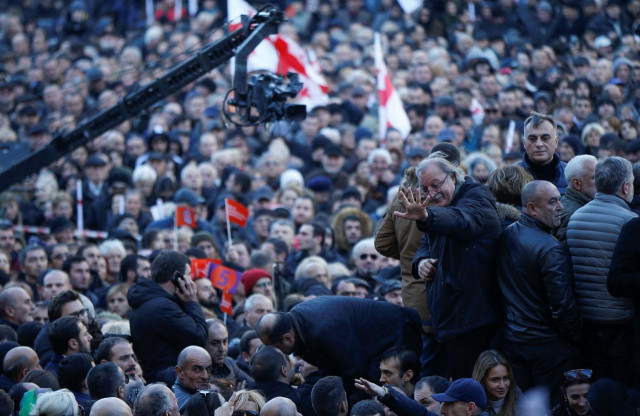Thousands in Georgia protest against presidential election results
Moscow’s influence in the country dominates Georgia’s domestic politics

Opposition leader and former presidential candidate Grigol Vashadze greets his supporters during a rally near the parliament building in Tbilisi, Georgia December 2, 2018. PHOTO: REUTERS
Vashadze has described the election as a “criminal farce” and has called for snap parliamentary elections after the central election commission said on Thursday that Salome Zurabishvili, who was backed by the ruling Georgian Dream party, had secured 59.5 per cent of the vote. Vashadze had 40.5 per cent, it said.
“We don’t recognize illegitimate results of this rigged election and demand an early parliamentary election to be called in the country,” Vashadze told thousands of supporters at Sunday’s rally in Tbilisi.
Zurabishvili is set to become the country’s first female head of state, although the role is largely ceremonial.
US judge will not force Georgia to use paper ballots despite concerns
Vashadze said the opposition planned to challenge the election results in court and would offer to work with the government to make changes to the electoral code, followed by snap parliamentary elections.
International observers, in their assessment of the election, said on Thursday that the vote was competitive, but the ruling party had enjoyed an “undue advantage” and increased misuse of administrative resources “further blurred the line between party and state.”
Vashadze said that if the government rejects the opposition’s demands, another peaceful protest would be held on Dec. 16, the day of the president-elect’s inauguration.
Political analysts say they do not expect the election result to trigger any serious unrest in Georgia, an ally of the United States in the Caucasus region.
Under a revised constitution, the prime minister and government wield most executive power. But the presidency is still seen as an important position as the international face of the country, which aims to secure better relations with the West to counter Moscow’s influence.
Georgia ruling party faces test in presidential vote
Both Zurabishvili and Vashadze favour strong ties with the West.
Zurabishvili, a former French career diplomat who served as Georgia’s foreign minister from 2004-2005, told Reuters in an interview on Saturday that the opposition’s call for people to refuse to recognize the results of the election served Russia’s interests.
“That’s exactly what Russia would have wished for - to have a very divided and very weakened country and a discredited president whose legitimacy is under attack,” she said.
Moscow’s influence in the country dominates Georgia’s domestic politics, with rival parties accusing each other of being insufficiently firm in confronting it.
Russia fought and won a brief war against Georgia in 2008, after which Moscow recognized the independence of two Georgian breakaway regions, South Ossetia and Abkhazia. Russia now has troop garrisons in the two regions.



















COMMENTS
Comments are moderated and generally will be posted if they are on-topic and not abusive.
For more information, please see our Comments FAQ